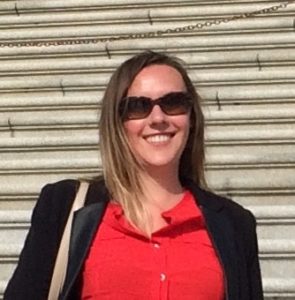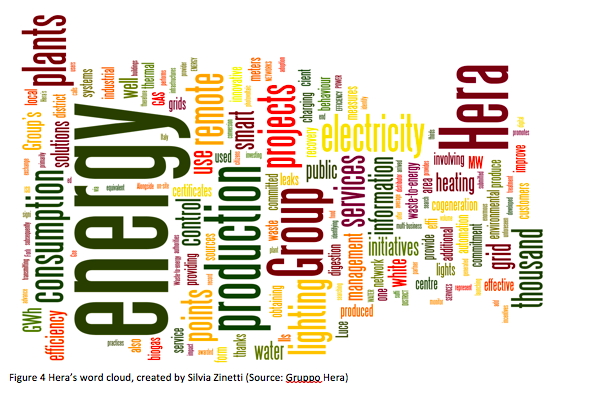 By SILVIA ZINETTI
By SILVIA ZINETTI
A unique approach that could change the way utilities do business around the world
Today I want to bring to the attention of the reader The Hera Group (Gruppo Hera), an Italian multi-utility that with its unique business strategy respects the environment while creating shared value to its customers. The company brings innovation on all fronts, from Circular Economy, Utility 4.0, Smart City, to Customer Experience. Let’s start from the beginning.
Hera (Holding Energia Risorse Ambiente) was created in 2002 as the first Italian experiment in the combination of council-owned companies into a single multi-utility to optimize their respective assets and provide for efficient and integrated services to their customers. Hera is mainly a publicly-owned company, where the shareholder municipalities are united under a shareholders’ agreement. The company operates in over 350 municipalities in the Italian regions of Emilia Romagna, Friuli-Venezia Giulia, Marche, Tuscany, and Veneto. Today Hera is one of Italy’s biggest local utility companies, a leader in energy, waste management, and water services, serving more than 4 million citizens. The energy services include electricity, gas, and district heating.
This article focuses on Hera’s innovative business approach, and how the company delivers shared values while contributing to the United Nations (UN) Sustainable Development Goals.
Hera’s unique approach and innovative strategy
Hera’s strategic drivers are innovation, efficiency, growth, excellence, and agility. Sustainability has been at the center of the business strategy since its establishment. In 2016, the company decided to move forward to take an active role in the 2030 Agenda for Sustainable Development of the United Nations and its 17 Sustainable Development Goals (SDG) [i].
The new strategic approach includes creating Shared Value to Corporate Social Responsibility (CSR) and sustainability to maximize the value creation for both the company and the community in which it operates. The shared value is originated by the operating profits from all the activities and projects in line with the priorities of the Global Agenda. According to Hera, this new approach will allow to:
- “Improve the company’s performance in terms of environmental and social sustainability; mostly related to business management and also to industry standards;
- generate operating profit margins responding to “Global Agenda” priorities”[ii].
Act local, think global
Hera covers 10 of the 17 UN Sustainable Development Goals, and categorizes the identified priorities in three main drivers of change: efficient use of resources, smart use of energy, and innovation and development.
In 2016 the shared value accounted for 33% of Hera’s Operating Profit Margin (OPM), approximately 300 million euro[iii]. Major highlights include a 7.6% reduction of municipal waste disposal to a landfill (ahead of schedule to comply with the European Union targets set for 2030), a 2.6% reduction of the energy consumption compared to 2013, with a goal of 5% by 2020, a 10% carbon footprint drop for the energy production, with a target of 19% by 2020 compared to 2015, and more than 70% energy production from renewable and assimilated sources[iv]. Furthermore, the company made a commitment to power all Hera Spa’s activities in the Emilia-Romagna region with 100% renewable energy[v].
The following infographic visualizes Hera’s strategic priorities aligned with the UN Sustainable Development Goals, the areas of impact, and the 2016 achievements:
Figure 3 Hera’s global strategic priorities and the 2016 results infografic, created by Silvia Zinetti (Source: Gruppo Hera)
Innovation @ 360°
Hera is fully committed to innovation. The utility sector is receiving increasingly pressure from both regulatory and technological side, with new technology and new competitors disrupting the way utility do business. For this reason, innovation is key in Hera’s strategy.
The company embraced the Circular Economy concept, by recently joining the CE100 programme[vi] of the Ellen MacArthur Foundation. Hera’s commitment include both the not-renewable materials management through an increase of programmes and projects for recycling, reuse and redistribute, renovate and repair, and the renewable resources management with the production of renewable energy from organic waste through anaerobic bio-digestion plants, and high-quality compost. Hera has planned the construction of a biorefinery to produce bio-methane, also for automotive use, from the end of 2018, and has targeted experimental projects to produce advanced biofuels from prunings and wastewater treatment sludge[vii].
Another innovation comes from its contribution toward Smart Cities. Hera is investing and introducing new technologies to improve the living conditions in the cities in which operates and the overall services delivered to the public. Projects aim at the improvement of urban quality through the monitoring of environmental parameters, sustainable mobilitythrough the development of charging stations for vehicles and bicycles, and development of city energy maps to assess historical performance of energy consumption and predict future performances. The ultimate goal is to develop a big data model able to combine and process the collected data and to improve efficiency in an integrated way[viii].
Hera is a Utility 4.0, with its drone-based electricity grid control to inspect the lines visually to quickly identify malfunctions and promptly repair them, and the IOSight project for advanced plant monitoring, a system that allows the plant’s real-time performances by integrating remote control data with the plant information (size, volume, assets, etc.). These innovative control and monitoring systems allows for a more efficient and smooth running of operations while reducing time of repair and the overall costs[ix].
Lastly, Hera listens to its consumers’ needs and desires, and understands the needs of the local community. Based on this, the company offers a new bill, which is more transparent, easy to understand, and shows the customer’s consumption trends and highlights the key figures. In addition, Hera launched a successful “Stop paper bills, give your city a tree” campaign to promotes online bill, having more than 150,000 customers signing up in the past four years[x].
Considerations
The utility sector is changing rapidly all over the world. Today many new actors are on the market, and innovative business models and technologies can disrupt the way utilities do business. Hera had the vision to incorporate sustainability in its business strategy since the beginning and to include the global challenges as a new approach. The company also invests in innovation as a way to improve its overall competitiveness. This not only makes the company stronger on the market, but also makes it actively contributing to the challenges the world is facing today.
The Hera Group is a great example of how utilities can redefine their business around sustainability without losing profits. Besides, consumers are changing their behavior toward a more sustainable energy, and business in general, and those needs must be taken into account by the local utilities.
More to follow about the Hera Group in the next article.
[i] http://www.un.org/sustainabledevelopment/sustainable-development-goals/
[ii] http://eng.gruppohera.it/group/social_responsibility/shared_value/
[iii] http://eng.gruppohera.it/group/social_responsibility/shared_value/
[iv] According to the Italian provision Cip n. 6/92, plants powered by assimilated sources include cogeneration plants, plants that use heat recovery, exhaust fumes and other forms of energy recoverable in production processes and in plants, as well as plants that use waste processing and those that use fossil sources produced exclusively from isolated minor deposits.
[v] 2016 Sustainability Report Highlights. Gruppo Hera (p. 10)
[vi] The Circular Economy 100 is a pre-competitive innovation programme established to enable organisations to develop new opportunities and realise their circular economy ambitions faster. https://www.ellenmacarthurfoundation.org/ce100/the-programme/enabling-collaboration
[vii] http://eng.gruppohera.it/group/who_we_are/strategy/shared_value/hera_circular_economy/
[viii] 2016 Sustainability Report. Gruppo Hera (p. 27-29)
[ix] 2016 Sustainability Report. Gruppo Hera (p. 29-30)
[x] http://eng.gruppohera.it/group/social_responsibility/target_performance/case_study/page272.html
Editor’s note: This article originally appeared on Energy in Demand at https://energyindemand.com/2018/02/10/blog-from-silvia-zinetti-the-hera-group-from-local-utility-to-global-sustainable-development-a-unique-approach-that-could-change-the-way-utilities-do-business-around-the-world/
Silvia Zinetti is a sustainable energy expert and policy advisor, based in Arlington, Virginia.
Leaders in Energy will be hosting an event on Utilities of the Future on Thursday, October 4th, 5:30 – 8:30 pm, at the Edison Electric Institute.
For more information: https://leadersinenergy.org/utilities-of-the-future/ and registration: https://events.r20.constantcontact.com/register/eventReg?oeidk=a07efnsxsvid123e11d&oseq=&c=&ch=






Leave a Reply